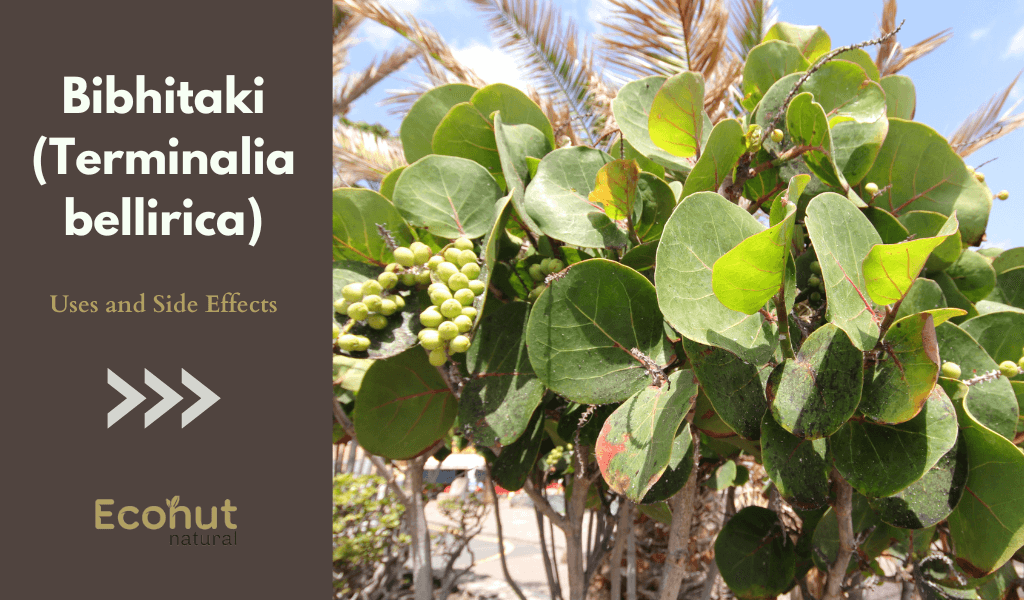Bibhitaki, also known as Terminalia bellirica, is a large deciduous tree native to Southeast Asia, including India, Nepal, Sri Lanka, and Thailand. It is one of the three key herbs in the traditional Ayurvedic formula Triphala, along with Amalaki (Emblica officinalis) and Haritaki (Terminalia chebula).
Discription
Bibhitaki, scientifically known as Terminalia bellirica, is a large deciduous tree native to Southeast Asia, including countries like India, Nepal, Sri Lanka, and Myanmar. It belongs to the Combretaceae family.
Appearance:
Bibhitaki trees typically grow up to 30 meters in height and have a straight trunk with a light grey bark. The leaves are elliptic-oblong and clustered towards the ends of the branches. They are glossy green above and pale green beneath.
Fruit:
The most notable feature of Bibhitaki is its fruit, which is about 2 to 2.5 cm in diameter and yellowish-green when ripe. The fruit has a woody shell and contains a single large seed. It has astringent taste.
Bibhitaki (Terminalia bellirica) Classification
| Kingdom | Plantae |
| Order | Myrtales |
| Family | Combretaceae |
Bibhitaki (Terminalia bellirica) Names
English: Baheda
Latin: Terminalia
Hindi: Baheda
Dravidi: Tanikooya
Kannada: Tarekapi
Arabic: Balelaj
Sanskrit: Vibhitak, Akshay, Karshfala, Kalidrum
Bengali: Bayada
Punjabi: Baheda
Telugu: Vadikaya
Persian: Talelah
Farsi: Baleel
Ayurvedic Properties
Hindi / Sanskrit
- Rasa, Kshaya
- Guna, Laghu, Ruksha
- Virya, Ushna
- Vipaka, Madhur
English
- Taste, Astringent
- Physical Property, Light, Dry
- Potency, Hot
- Metabolic Property (After Digestion), Sweet
Bibhitaki (Terminalia bellirica) Benefits
Bibhitaki, also known as Terminalia bellirica, is a medicinal plant that has been used in traditional Ayurvedic medicine for centuries. Here we are discuss some benefits regarding Bibhitaki:
Improve Digestive System:
Bibhitaki is commonly used to promote digestive health. It may help alleviate various digestive issues such as constipation, diarrhea, and flatulence. It is believed to have mild laxative properties that can help regulate bowel movements.
Helps Better Respiratory:
Bibhitaki may also be beneficial for respiratory health. It is used in traditional medicine to alleviate symptoms of respiratory conditions such as cough, asthma, and bronchitis.
Contain Antioxidant Elements:
Bibhitaki contains various antioxidants that help neutralize harmful free radicals in the body. These antioxidants may help protect cells from oxidative damage and reduce the risk of chronic diseases.
Opposes diabetic desease:
The Medical Sceince suggest that Bibhitaki may have anti-diabetic effects. It may help regulate blood sugar levels and improve insulin sensitivity, making it potentially beneficial for individuals with diabetes.
Removes toxic in body:
In Ayurveda, Bibhitaki is considered to have detoxifying elements. It is believed to help eliminate toxins from the body, thereby supporting overall health and well-being.
Opposes Inflammatory Effects:
The medical sciences some study suggests that Bibhitaki may contain anti-inflammatory properties. It may help reduce inflammation in the body, which is regarding with various health conditions, including arthritis and inflammatory bowel diseases.
Also Read: Ushira, Vetiver (Vetiveria Zizanioides): Uses, Benefits and Side Effects
Side Effects of Bibhitaki (Terminalia bellirica)
While Bibhitaki (Terminalia bellirica) is generally considered safe for most individual when taken in appropriate doses, like any herbal remedy, it may cause side effects in some individuals. Here, We discuss some side effects regarding Bibhitaki:
Hypoglycemia Issue:
This herb may lower blood sugar levels, which can be problematic for peoples with diabetes or hypoglycemia. It’s important for individual with these conditions to monitor their blood sugar levels closely while using Bibhitaki and to consult with a healthcare professional before incorporating it into their regimen.
Damage Digestive System:
Bibhitaki may lead to gastrointestinal discomfort such as stomach upset, cramping, bloating, or diarrhea. This is more likely to occur when Bibhitaki is taken in large doses.
Produces Allergic Reactions:
Some people may be allergic to Bibhitaki or other members of the Terminalia genus. Allergic reactions include manifest as itching, rash, swelling, or difficulty breathing. If you experience any allergic symptoms after taking Bibhitaki, discontinue use and seek medical attention.
Medicine Interactions:
This herb may interact with certain medications, including blood sugar-lowering drugs, anticoagulants (blood thinners), and medications metabolized by the liver. If you are taking any medications, especially those with a narrow therapeutic index, it’s essential to consult with a healthcare professional before using Bibhitaki to avoid potential interactions.
Avoid During Pregnancy and Breastfeeding:
Pregnant and breastfeeding women should exercise caution and consult with a healthcare provider before using Bibhitaki to assess its safety for their specific situation.
High Dosage Produce Toxicity:
While rare, excessive consumption of Bibhitaki may lead to toxicity symptoms such as nausea, vomiting, and liver damage. It’s important to adhere to recommended dosage guidelines and avoid exceeding safe intake levels.
Effects On Blood Pressure:
This herb may have blood pressure-lowering effects, which could be problematic for peoples with hypotension (low blood pressure). If you have low blood pressure or are taking medications to lower blood pressure, use Bibhitaki cautiously and monitor your blood pressure regularly.
Conclusion
Bibhitaki, also known as Terminalia bellirica, emerges as a botanical gem with a rich history in traditional medicine. Its versatility shines through its diverse range of health benefits, spanning from digestive support to respiratory wellness. Scientific research highlights its potent antioxidant and anti-inflammatory properties, underscoring its therapeutic potential. Bibhitaki stands as a botanical powerhouse, bridging the gap between ancient wisdom and modern healthcare.
FAQS
Does Bibhitaki have any side effects?
While side effects from Bibhitaki are rare, some individuals may experience mild gastrointestinal discomfort, such as bloating or diarrhea, especially when consumed in large doses. It’s essential to follow recommended dosage guidelines and monitor your body’s response.
Can Bibhitaki help with weight loss?
Bibhitaki is sometimes included in weight loss formulations due to its mild laxative properties and its potential to support digestion and metabolism. However, there is limited scientific evidence directly linking Bibhitaki to weight loss, and its effectiveness may vary from person to person.
Does Bibhitaki boost the immunity?
Yes, Bibhitaki is boost immunity.
What are the health benefits of Bibhitaki?
Bibhitaki is believed to possess various health benefits, including its potential to promote digestion, support respiratory health, improve eyesight, and act as an antioxidant. It is also known for its mild laxative properties and its ability to help regulate bowel movements.

